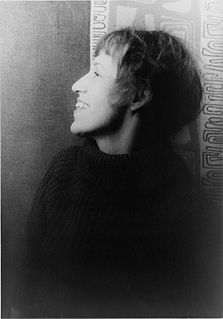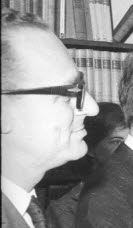
The Threepenny Opera is a "play with music" by Bertolt Brecht, adapted from a translation by Elisabeth Hauptmann of John Gay's 18th-century English ballad opera, The Beggar's Opera, and four ballads by François Villon, with music by Kurt Weill. Although there is debate as to how much, if any, Hauptmann might have contributed to the text, Brecht is usually listed as sole author.

Kurt Julian Weill was a German composer, active from the 1920s in his native country, and in his later years in the United States. He was a leading composer for the stage who was best known for his fruitful collaborations with Bertolt Brecht. With Brecht, he developed productions such as his best-known work The Threepenny Opera, which included the ballad "Mack the Knife". Weill held the ideal of writing music that served a socially useful purpose. He also wrote several works for the concert hall. He became a United States citizen on August 27, 1943.

Lotte Lenya was an Austrian-American chanteuse, diseuse, and actress, long based in the United States. In the German-speaking and classical music world, she is best remembered for her performances of the songs of her first husband, Kurt Weill. In English-language cinema, she was nominated for an Academy Award for her role as a jaded aristocrat in The Roman Spring of Mrs. Stone (1961). She also played the murderous and sadistic Rosa Klebb in the James Bond movie From Russia with Love (1963).

The Staatsoper Unter den Linden, also referred to as „Berlin State Opera“,(German: Staatsoper Berlin) is a listed building on Unter den Linden boulevard in the historic center of Berlin. It was erected by order of Frederick the Great from 1741 to 1743 according to plans by Georg Wenzeslaus von Knobelsdorff in Palladian style. Damaged during the Allied bombing in World War II, the former Royal Prussian Opera House was rebuilt from 1951 to 1955 as part of the Forum Fridericianum square. Nicknamed Lindenoper, it is "the first theater anywhere to be, by itself, a prominent, freestanding monumental building in a city."

The Leipzig Opera is an opera house and opera company located at the Augustusplatz in Leipzig, Germany.

The Deutsche Oper Berlin is an opera company located in the Charlottenburg district of Berlin, Germany. The resident building is the country's second largest opera house and also home to the Berlin State Ballet.

Michael Andreas Gielen was an Austrian conductor and composer who promoted contemporary music in opera and concert.

John Francis Mauceri is an American conductor, producer, educator and writer. Since making his professional conducting debut almost half a century ago, Mauceri has appeared with most of the world's great orchestras, guest conducted at the premiere opera houses, produced and musically supervised Tony and Olivier Award-winning Broadway musicals, and served as university faculty and administrator. Through his varied career, he has taken the lead in the preservation and performance of many genres of music and has supervised/conducted important premieres by composers as diverse as Debussy, Stockhausen, Korngold, Hindemith, Bernstein, Sibelius, Ives, Elfman, and Shore. He is also a leading performer of music banned by the Third Reich and especially music of Hollywood's émigré composers.

Friedrich Carl Georg Kaiser, called Georg Kaiser, was a German dramatist.

Der Zar lässt sich photographieren is an opera buffa in one act by Kurt Weill, op. 21. The German libretto was written by Georg Kaiser, and Weill composed the music in 1927. It is a Zeitoper, a genre of music theatre which used contemporary settings and characters, satiric plots which often include technology and machinery. Musically the Zeitoper genre tends to be eclectic and borrow from Jazz. The genre has practically disappeared from the world's opera houses. Historically the Zeitoper came to an abrupt end with the Nazi period, and after the war the cultural institutions were perhaps hesitant to return to the lighter, often decadent and comic operas written before the holocaust changed the artistic perspective. This conjecture is supported by the statistical fact that of all of Weill's, Schönberg's, Hindemith's and Krenek's works - it is these very shorter, satirical Zeitoper works that are no longer performed.

Die Bürgschaft is an opera in three acts by Kurt Weill. Caspar Neher wrote the German libretto after the parable Der afrikanische Rechtspruch by Johann Gottfried Herder. Composed from August to October 1931, it was premiered on 10 March 1932 at the Städtische Oper in Berlin, Germany.
Barry McDaniel was an American operatic baritone who spent his career almost exclusively in Germany, including 37 years at the Deutsche Oper Berlin. He appeared internationally at major opera houses and festivals, and created roles in several new operas, including Henze's Der junge Lord, Nabokov's Love's Labour's Lost, and Reimann's Melusine. He was also a celebrated concert singer and recitalist, focused on German Lied and French mélodie. He was the first singer of Wilhelm Killmayer's song cycle Tre Canti di Leopardi. He recorded both operatic and concert repertory.
Zeitoper was a short-lived genre of opera associated with Weimar Germany. It is not known when or by whom the term was coined, but by 1928 Kurt Weill was able to complain that it was more a slogan than a description. Like opera buffa it used contemporary settings and characters, comic or at least satiric plots and aimed at musical accessibility. Two distinguishing characteristics are a tendency to incorporate modern technology and frequent allusions to popular music, especially jazz. This last, more than any social satire, earned the suspicion of the political right and ensured that it would not survive into the Nazi era.
This is an audio and video discography of Tristan und Isolde, an opera by Richard Wagner which was first performed on 10 June 1865 in Munich.

The Theater des Westens is one of the most famous theatres for musicals and operettas in Berlin, Germany, located at Kantstraße 10–12 in Charlottenburg. It was founded in 1895 for plays. The present house was opened in 1896 and dedicated to opera and operetta. Enrico Caruso made his debut in Berlin here, and the Ballets Russes appeared with Anna Pavlova. In the 1930s it was run as the Volkstheater Berlin. After World War II it served as the temporary opera house of Berlin, the Städtische Oper. In 1961 it became the first theatre in Germany to show musicals. Since then it has become the "German equivalent of Broadway extravaganzas", putting on plays and musical comedies.
Bertlies "Lys" Symonette was a German-American pianist, chorus singer and musical stage performer. In 1945 she took a job as rehearsal pianist, coach, understudy or multi-tasking "swing-girl" for The Firebrand of Florence, a Kurt Weill musical making its Broadway debut. This proved to be the start of a new career as Weill's musical assistant: from that point a principal focus of her professional life was on the composer and, more particularly after his early death in 1950, the career of his widow, the stage performer Lotte Lenya. When Lenya died, in 1981, Lys Symonette was appointed vice-president of the Kurt Weill Foundation, also serving as its "musical executive". When she died her friend and frequent collaborator, Prof. Kim H. Kowalke, published an affectionate tribute in which he described her as "the last and irreplaceable link to the inner artistic circle of Weill and Lenya".

Wolfgang Rennert was a German conductor. He focused on opera, at the Oper Frankfurt, Staatsoper Berlin, Mannheim National Theatre and the Semperoper, among others. He premiered operas, such as Louise Talma's Die Alkestiade in Frankfurt, and Rainer Kunad's Sabellicus in East Berlin. Regarded as a specialist in Mozart, Wagner and Strauss, he was a guest conductor at international opera houses including the Royal Opera House in London, the San Francisco Opera and the Dallas Opera.

Melitta Muszely is an Austrian operatic soprano and a voice teacher. She made a career based in Germany, mainly at the Hamburg State Opera with guest contracts to the Komische Oper Berlin and the Vienna State Opera, among others. She took part in world premieres, and performed internationally in Europe. She appeared as all four female characters in Offenbach's Hoffmanns Erzählungen in the legendary 1958 production by Walter Felsenstein, and sang recitals until 2008.
Ruth Hesse is a German operatic mezzo-soprano and contralto. She was a member of the Deutsche Oper Berlin from 1962 to 1995, and appeared internationally, including the Bayreuth Festival and the Salzburg Festival. She appeared regularly at the Vienna State Opera from 1965 to 1988, and was appointed an Austrian Kammersängerin in 1982. In Berlin, she took part in the world premiere of Henze's Der junge Lord.

Judith is an opera in two acts by Siegfried Matthus with a libretto by the composer based on Friedrich Hebbel's Judith and texts from the Old Testament. The premiere was on 28 September 1985 at the Komische Oper Berlin, directed by Harry Kupfer. It was recorded in a studio production.













